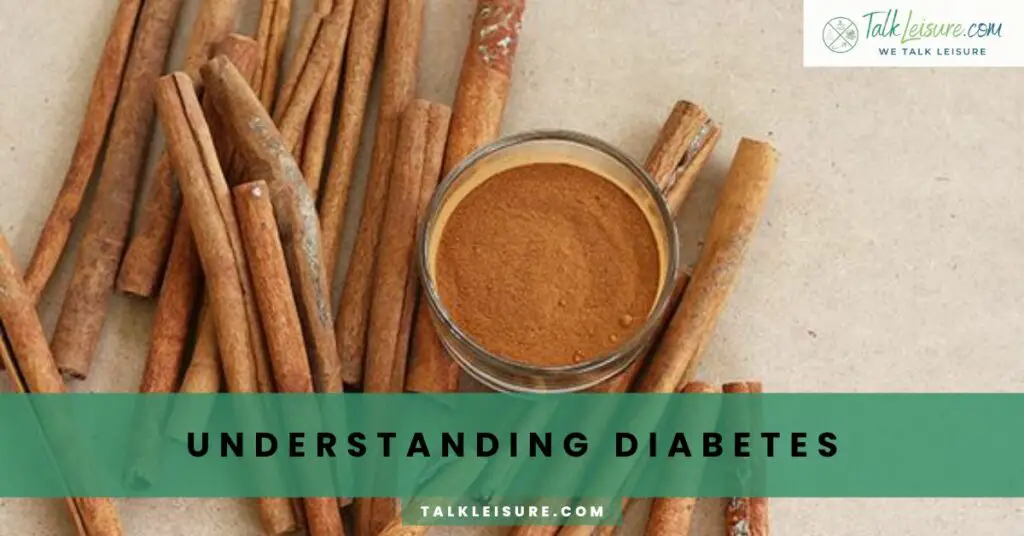Discover the potential benefits of cinnamon in regulating blood sugar levels and managing diabetes on our informative website.
Cinnamon, a popular spice derived from the inner bark of trees, has been used for centuries for its distinct flavor and aroma.
In recent years, it has gained attention for its potential role in managing diabetes and regulating blood sugar levels.
In this article, we will explore the history and popularity of cinnamon in managing diabetes, as well as its potential benefits and concerns.
Cinnamon and Heart Health: What Does Research Say?
History and Popularity of Cinnamon in Managing Diabetes

Cinnamon has a long history of use in traditional medicine for various ailments, including diabetes.
Ancient civilizations, such as the Egyptians and Romans, believed in the medicinal properties of cinnamon.
In recent years, research studies have examined the effects of cinnamon on blood sugar levels and insulin sensitivity, leading to its increased popularity as a natural remedy for diabetes management.
Cinnamon’s effects on blood sugar
Benefits and Concerns of using Cinnamon for Blood Sugar Regulation
Using cinnamon for blood sugar regulation may offer several potential benefits.
Some studies suggest that cinnamon can enhance insulin sensitivity, improve glucose metabolism, and lower fasting blood sugar levels in individuals with type 2 diabetes.
It may also have anti-inflammatory and antioxidant properties that can help reduce the risk of complications associated with diabetes.
However, while cinnamon shows promise, it is important to note that more research is needed to fully understand its effectiveness and recommended dosage.
Certain individuals may be more susceptible to adverse effects, such as allergic reactions or interactions with medications.
Therefore, it is essential to consult with a healthcare professional before incorporating cinnamon into your diabetes management plan.
Understanding Diabetes

Diabetes and its Impact on Blood Sugar Levels
Diabetes is a chronic condition that affects the body’s ability to regulate blood sugar levels. There are two main types of diabetes: type 1 and type 2.
In type 1 diabetes, the body does not produce enough insulin, a hormone responsible for regulating blood sugar.
In type 2 diabetes, the body becomes resistant to insulin or does not use it effectively.
High blood sugar levels in diabetes can lead to various complications, including cardiovascular disease, nerve damage, and kidney problems.
Managing blood sugar levels is therefore crucial for individuals with diabetes to prevent these complications and maintain overall health.
Factors Affecting Blood Sugar Regulation in Individuals with Diabetes
Several factors can affect blood sugar regulation in individuals with diabetes.
These include diet, physical activity, stress levels, medication use, and overall lifestyle choices.
Diet plays a significant role in managing blood sugar levels.
Consuming a balanced diet that includes carbohydrates, proteins, and fats in appropriate portions can help regulate blood sugar.
Regular exercise also helps improve insulin sensitivity and lowers blood sugar levels.
Stress can cause blood sugar levels to rise, making it important for individuals with diabetes to find effective stress management techniques.
Medications prescribed by healthcare professionals may also be necessary to control blood sugar levels.
Overall, managing blood sugar levels in diabetes requires a comprehensive approach that includes a healthy diet, regular exercise, stress management, and appropriate medication use.
Consulting with a healthcare professional is essential to develop a personalized diabetes management plan.
The Science Behind Cinnamon

Active Compounds in Cinnamon and their Potential Effects on Blood Sugar
Cinnamon is not only a delicious spice, but it may also have some potential benefits for individuals with diabetes.
It contains active compounds, such as cinnamaldehyde and cinnamic acid, which have been studied for their effects on blood sugar regulation.
These compounds are believed to enhance insulin sensitivity and promote better glucose metabolism.
However, more research is needed to understand the exact mechanisms behind these effects.
Research Studies on the Relationship Between Cinnamon and Blood Sugar Control
Numerous studies have suggested a positive relationship between cinnamon consumption and blood sugar control.
A study published in the journal Diabetes Care found that consuming cinnamon significantly reduced fasting blood sugar levels in individuals with type 2 diabetes.
Another study published in The Journal of Nutrition reported that cinnamon supplementation improved insulin sensitivity and reduced postprandial blood sugar levels in individuals with prediabetes.
Nevertheless, it’s important to note that while cinnamon shows promise, it should not be used as a substitute for medical treatment or prescribed medication.
Incorporating cinnamon into a healthy diet and lifestyle can be beneficial, but it’s crucial to consult with a healthcare professional to determine the appropriate dosage and ensure it complements your diabetes management plan.
Cinnamon and Blood Sugar Regulation
Research suggests that cinnamon may have a positive impact on blood sugar regulation.
While the exact mechanisms are still being studied, there are several hypotheses as to how cinnamon may help in managing blood sugar levels:
- Cinnamon may increase insulin sensitivity, allowing cells to better absorb glucose from the bloodstream.
- It may inhibit enzymes that play a role in carbohydrate digestion, slowing down the release of glucose into the bloodstream.
- Certain compounds in cinnamon, such as cinnamaldehyde, may mimic insulin and promote glucose uptake in cells.
- Cinnamon may also have antioxidant properties that protect against cellular damage caused by high blood sugar levels.
Other Health Benefits
Additional Health Benefits of Cinnamon Beyond Blood Sugar Regulation
I also wanted to share some additional health benefits of cinnamon that go beyond blood sugar regulation.
While more research is needed to fully understand these benefits, there is evidence to suggest that cinnamon may have positive effects on the following aspects of health:
- Antimicrobial properties: Cinnamon has been found to possess antimicrobial properties, which may help in fighting against certain bacteria and fungal infections.
- Anti-inflammatory effects: Some studies have suggested that cinnamon may have anti-inflammatory properties, potentially reducing inflammation in the body, which is believed to be involved in the development of chronic diseases.
- Heart health: Research indicates that cinnamon may have a positive impact on heart health by helping to lower cholesterol levels, triglycerides, and blood pressure.
- Antioxidant activity: Cinnamon contains antioxidants that can help protect the body’s cells from damage caused by free radicals, which are unstable molecules that contribute to aging and several chronic diseases.
These potential health benefits make cinnamon a versatile spice that can be easily incorporated into your daily routine.
However, it is always important to consult with your healthcare professional before making any significant changes to your diet or health regimen.
Incorporating Cinnamon into Your Diet
Creative Ways to Include Cinnamon in Your Meals and Snacks
- Antimicrobial properties: Cinnamon has been found to possess antimicrobial properties, which may help in fighting against certain bacteria and fungal infections.
- Anti-inflammatory effects: Some studies have suggested that cinnamon may have anti-inflammatory properties, potentially reducing inflammation in the body, which is believed to be involved in the development of chronic diseases.
- Heart health: Research indicates that cinnamon may have a positive impact on heart health by helping to lower cholesterol levels, triglycerides, and blood pressure.
- Antioxidant activity: Cinnamon contains antioxidants that can help protect the body’s cells from damage caused by free radicals, which are unstable molecules that contribute to aging and several chronic diseases.
These potential health benefits make cinnamon a versatile spice that can be easily incorporated into your daily routine.
Here are some creative ways to include cinnamon in your meals and snacks:
- Sprinkle cinnamon on your morning oatmeal or yogurt.
- Add a dash of cinnamon to your coffee or tea.
- Use cinnamon in your baking recipes, such as cookies or muffins.
- Mix cinnamon into smoothies or shakes for a delicious and nutritious boost.
- Sprinkle cinnamon on top of roasted vegetables for a warm and flavorful twist.
- Add cinnamon to savory dishes, such as stews or curries, for a unique flavor profile.
Frequently Asked Questions
Can cinnamon really help regulate blood sugar in people with diabetes?
Yes, there is evidence to suggest that cinnamon may have a positive effect on blood sugar levels. Some studies have shown that cinnamon can help increase insulin sensitivity and improve glucose metabolism. However, it is important to note that cinnamon should not replace medical treatment for diabetes. It should be used as a complementary therapy and individuals with diabetes should consult with their healthcare professional before incorporating cinnamon into their diet.
How much cinnamon should I consume to reap its benefits?
The recommended daily dose of cinnamon varies, but most studies have used 1 to 6 grams of cinnamon per day. It is important to start with a small amount and gradually increase it, as high doses of cinnamon may have adverse effects. It is also advisable to choose Ceylon cinnamon, which is considered to be of higher quality and contains lower levels of coumarin, a compound that may be harmful in large amounts.
Are there any side effects of consuming cinnamon?
Cinnamon is generally safe when consumed in moderate amounts. However, some individuals may be allergic or sensitive to cinnamon and may experience symptoms like skin rash, mouth sores, or difficulty breathing. Additionally, cinnamon may interact with certain medications, such as blood thinners. It is always best to talk to your healthcare professional before adding cinnamon to your diet, especially if you have any underlying health conditions or take medications.
Is it safe for pregnant women to consume cinnamon?
There is limited research on the safety of cinnamon consumption during pregnancy. While small amounts of cinnamon used in cooking are generally considered safe, taking large amounts of cinnamon supplements or powders may not be advisable. It is recommended that pregnant women consult with their healthcare professional before incorporating cinnamon into their diet.
Can cinnamon help with weight loss?
Some studies suggest that cinnamon may play a role in managing weight by improving insulin sensitivity, reducing inflammation, and increasing metabolism. However, more research is needed to fully understand the potential effects of cinnamon on weight loss. It is important to note that cinnamon alone is not a magic solution for weight management, and it should be combined with a healthy diet and exercise for optimal results.
Best Wishes!





